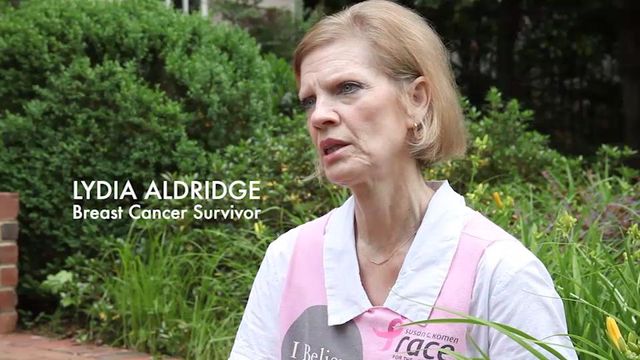Duke study targets rare, inflammatory breast cancer treatment
Inflammatory breast cancer is an extremely rare and aggressive disease in which cancer cells block lymph vessels in the skin of the breast.
Posted — UpdatedLydia Aldridge will never forget that October morning in 2005. She had gone to bed feeling fine and awoke the next morning with her chest looking as if she had been burned.
“I flipped up my gown I had on and my entire left chest, underarm, all around – everything was completely inflamed, swollen, extreme pain, excruciating. Being an RN that I am, I thought, wow, I must have a terrible case of mastitis,” she said.
Aldridge’s doctor agreed it was mastitis, an infection of the breast tissue. She was treated with an antibiotic and told that she would be better in a few days. But Lydia’s condition worsened and a breast biopsy proved she had stage 3 inflammatory breast cancer.
After the biopsy, Aldridge was referred to Duke. Her treatments began with chemotherapy, then a double mastectomy and radiation.
“It was just a long journey, a very long journey," she said.
"Had it not been for my wonderful, godly friends, I couldn’t have survived it. They just supported me, the loved me, they fed me, they took me back and forth to Duke. And then hats and wraps and scarves and all those things and people convincing me I look cute without hair!”
Becky Hester was one of those who stood by Aldridge every step of the way.
“She had so many friends that took care of her," Hester said. "The care calendar was just filled, and that was a lovely thing to see.”
Today, Aldridge is cancer-free and is planning to walk with Duke’s Komen Race for the Cure team.
“It feels like I’m giving a very small piece back to the community," she said. "For me, volunteering, it empowers me and others. You gain a lot more than what you’re giving away.”
And she wants all women to be aware of IBC, Inflammatory Breast Cancer.
“You have breast cancers that are all over here in this category and then you have inflammatory breast cancer over here in this little category by itself. It’s very different, blocking the lymph nodes, creating infection and spreading," Aldridge said. "We need more awareness, education, a lot more funding to do research on this particular kind of cancer breast cancer. It is more prevalent than it ever was.”
Recently, Dr. Devi was awarded a grant to launch the Duke Inflammatory Breast Cancer Consortium, and she is making progress.
“We found that a very old drug, one used to manage alcoholism called disulfiram, can kill IBC cells while sparing normal cells," she said. "Based on this exciting discovery, we are now trying to use and test this drug with current approaches like chemotherapy and radiation. So, hopefully we can have a better targeted treatment option and hoping to raise awareness about this and funds to conduct clinical trials.”
• Credits
Copyright 2024 by Capitol Broadcasting Company. All rights reserved. This material may not be published, broadcast, rewritten or redistributed.





